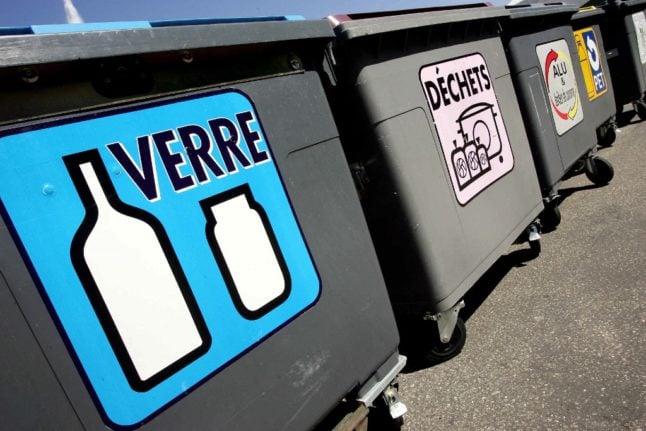You may believe that some of the things people in Switzerland are expected to do, either by law or convention, are too strict or downright odd, especially if you are used to doing them differently in your own country.
But the fact is that Switzerland works quite efficiently and is so well organised precisely because people follow the rules — whether they agree with them or not.
These are some that you should never break:
Wrong trash disposal / recycling
Switzerland is one of the world’s ‘Top 10’ best recyclers, and if you live here, you probably already got the hang of the system; if not, then you should.
That’s because garbage disposal here is a serious matter. How serious? Just look at what the law says.
In nearly all towns and villages, trash must be segregated and placed in special bags or in bags that have a special sticker on them, and placed in a designated collection point on assigned days.
Not segregating your trash — for instance, throwing out PET bottles with tin cans or paper, or not putting it out on correct days — can result in heavy fines, the amount of which is determined by each individual commune.
Municipal workers have the right to go through trash bags to identify garbage offenders — and they do.
READ MORE : Trash talk: What are the rules for garbage disposal in Switzerland?
Not taking out a health insurance policy
If you come from a country with a nationalised health system (as most EU nations are), you may resist paying for your own policy in Switzerland and expect the government to provide you with one.
But that’s not how it works.
There are two rules pertaining to health insurance : it is compulsory in for all legal permanent residents, and anyone who moves here must get health coverage within three months of their arrival.
READ MORE: Everything you need to know about health insurance in Switzerland
After that date, you will likely receive a letter from the government asking you to provide proof that you took out a policy.
If you fail to do so, your local authority will choose a plan on your behalf and you will have to pay the premiums.
If you don’t, you’ll be placed on a blacklist. Sooner or later (probably sooner) you’ll be caught and will have to pay arrears— the Swiss are very organised and efficient.
In the meantime, if you require medical help, you will receive only the emergency treatment; any follow-ups will be denied until you purchase insurance. So, refusing to buy one hurts no one but yourself.
It is also important for another reason: being a part of the community.
Switzerland’s health systemis based on the principle of solidarity, the extent of which is rare in other nations’ health insurance systems.
Rather than applying an individual approach to healthcare insurance, Switzerland’s system is based on the idea that all insured people form a group.
You can think of this system in terms of a huge pot to which each resident of Switzerland makes a contribution (that is, premium payments), so that in an emergency there are enough resources available to give someone the help they need when they need it.
READ MORE : EXPLAINED: How the Swiss health insurance system is based on solidarity
Being too intrusive
Basically, this means you should avoid annoying your neighbours and people in general.
For instance, you should not generate loud noises on inappropriate days (Sundays) and at inappropriate hours (10 pm to 7 am).
All apartment buildings in Switzerland have a noise ordinance in place, which bans loud noises after 10 pm. You might have heard that you are not even allowed to flush your toilet after this time, but in most buildings this is not the case, unless your toilet sounds like a jackhammer.
And Sundays are considered rest days, so your neighbours’ peace and quiet should not be disrupted by a sound of a lawn mower, hedge cutter, or nail being hammered into a wall.
But there is another aspect to intrusiveness as well.
The Swiss (especially the older generation) value their privacy and don’t like being prodded about their personal lives. So don’t ask what could be construed as inappropriate questions (for instance, “how much do you earn”?), but rather wait for them to open up themselves and divulge as much information as they feel comfortable doing.
By the same token, don’t expect them to show much curiosity about you either; as much as they value their own privacy, they value other people’s too — a trait which is often taken as aloofness.
Expecting everyone to speak English to you
There is an abundance of anecdotal and observational evidence about English-speakers in Switzerland never learning any of the local languages but rather expecting the Swiss to speak English to them.
Not only that, but these people actually get annoyed when the locals don’t answer in English.
Possibly because they believe that English is one of Switzerland’s official languages (it isn’t) or that it should be (it won’t), many don’t even make an effort to learn German, French, or Italian, just expecting everyone to understand and answer in English.
And this leads to another important point:
Refusal to integrate
The Swiss are big on “integration” — they believe, right or wrong (probably right), that foreigners should assimilate if they are going to be living in the country.
This doesn’t mean you should give up your own identity; instead, you should learn the language of the region where you live — if not fluently, at least sufficiently for you to communicate with the locals.
It also implies that you should get familiar with and show respect for the “Swiss” way of life: their customs, traditions, and practices — and yes, also their rules — no matter how inane you may think they are.
But there is even more: a number of articles have been written about people complaining about being disturbed by the chiming of bells on village clocks and around cows’ necks.
Bad, bad mistake.
That’s because this attitude shows not only lack of integration, but also unwillingness to adapt to local ways.
If such things bother you, don’t choose to live near a church, a pasture, or a rooster farm.
Insulting the national identity
The Swiss are very proud of their country — and themselves as people — and for a good reason.
Therefore, one of the worst things a foreigner can do (aside from all of the above points) is to call Swiss-Germans “Germans”, Swiss-French “French” and Swiss-Italians “Italians”.
No matter what language they speak or in which part of the country they live, identifying the Swiss by their linguistic region is a definite faux pas, especially if it comes from a foreigner.
The Swiss loathe to think of themselves as anything other than, well Swiss, especially as they look down on anyone else.
Whether they are justified in doing so or not is beside the point; what matters is that foreigners should not disabuse the Swiss of this notion on their own territory.
After all, there are worse things in life than patriotism and national pride.
READ MORE: ‘We don’t like France, Germany or Italy’: How linguistic diversity unites Swiss football fans
These articles provide more information about the ‘dos’ and ‘donts’ in Switzerland:



 Please whitelist us to continue reading.
Please whitelist us to continue reading.
Member comments